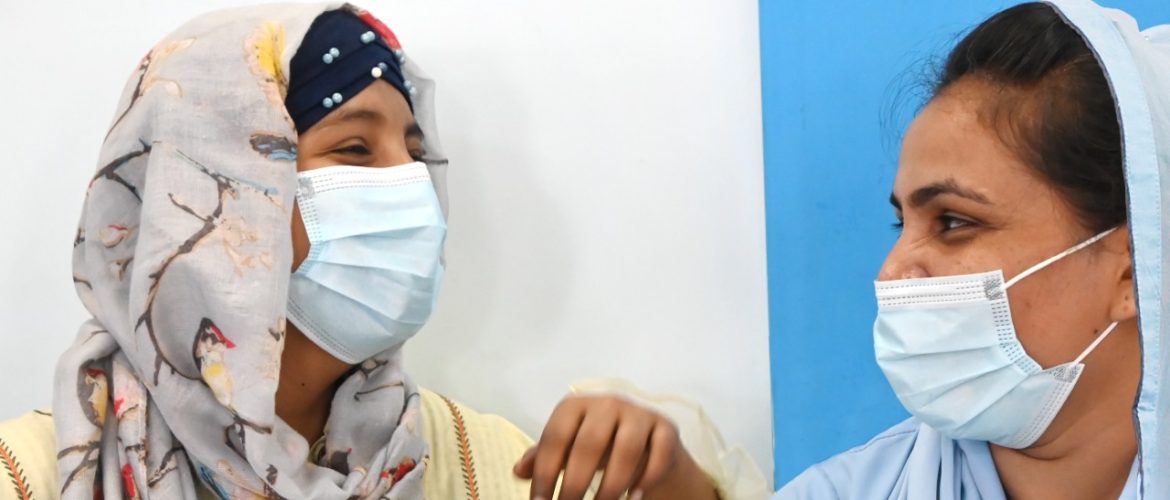THE JOURNEY WALKED TOGETHER – Diya
-
by
admin
“After I received my diagnosis, everyone started abandoning me except for my mother and a few close friends. I felt like it was all my fault and that I deserved it. But my mother and the nurses at Indus gave me the strength to persevere. Together, we have endured every hardship and celebrated every success together, as a family.”
Diya was born and raised in Karachi, where her family struggled to make ends meet. The poverty and lack of access to primary healthcare led to a difficult childhood for Diya. Despite the challenges she faced with her family, she never let them affect her outlook in life and was the leader of her group of friends.
However, everything changed a few months after her 15th birthday. She started experiencing extreme nausea and would be feverish for weeks, leaving her unable to stand up or lie down comfortably, robbing her of breath and sapping her strength. She was left bedridden and barely able to move, dependent on her family for even the simplest tasks.
Her family realized that they would have to get Diya to a private hospital to receive the medical attention she needed. They pooled their entire savings and pleaded with their neighbors and relatives for financial assistance. While a few of them stepped forward to lend their support, most avoided them outright. And so Diya, who used to be constantly surrounded by friends and cousins that cheered her up, suddenly found herself more alone than she had ever been in her life.
Her family finally saved enough to have Diya admitted to a private hospital. The doctors diagnosed her with blood cancer and discovered a buildup of fluid behind her heart and in her lungs. She would need ongoing treatment over a period of months, maybe even years. Realizing that they would be unable to afford the treatment, the doctors there referred them to the Indus Hospital & Health Network (IHHN), Korangi campus.
At IHHN, Diya was not only given quality treatment completely free of cost but also received psychosocial counseling to help her deal with the mental trauma she had suffered throughout her ordeal. Diya, whose smile would light an entire room, was left a shell of herself through the constant travel and guilt over what her condition was costing her family. The nurses at the pediatric ward came forward and helped Diya take the first step toward recovery.
“Even though the chemotherapy and the needles are awful, I still look forward to coming to the daycare center because I am close. The nurses here are very nice, especially Samina. She’s like the big sister I’ve always wanted. We laugh and joke together, and she even brings me food whenever I’m feeling down. She’s my inspiration and role model, and when I go back to school (for higher education), I want to be exactly like her.”
What surprised Diya the most was how involved the medical staff were and did what they could to relieve her of any stress. She describes how Samina would hold her hand, hug her or distract her with jokes when the medication couldn’t reduce the pain. During Diya’s visits, they would have lunch together.
Samina was pleased with how far Diya had progressed in her battle against cancer and called her a true warrior. “Diya keeps telling us how we nurses inspire her to do better and fight against her demons, but truth be told, she’s the one who has inspired all of us. We realize the responsibility on our shoulders and how important our roles are to our patients, who are dependant on us for guidance and comfort,” she says, “Diya’s response to the hardships she faced in her young life gives meaning to our work. We are honored to have such an important role on these warriors’ road to recovery.”
Diya is thankful to all the nurses at the Indus Hospital and is grateful for their tireless efforts in stepping in and making her journey in the recovery from cancer one of relative ease. Samina and her fellow nurses’ compassion and expertise play a crucial role in all of their patients’ lives, and they strive always to provide extra support and love to transform the lives of their patients. They know that a gesture as simple as a smile and a hug can make all the difference in the world.





